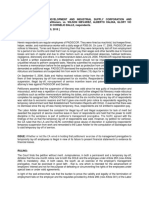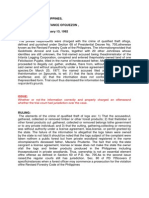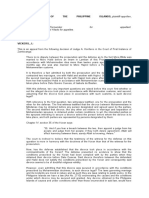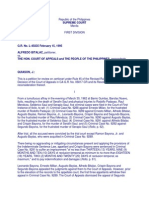Case Digest
Case Digest
Uploaded by
Anonymous ubixYACopyright:
Available Formats
Case Digest
Case Digest
Uploaded by
Anonymous ubixYAOriginal Description:
Original Title
Copyright
Available Formats
Share this document
Did you find this document useful?
Is this content inappropriate?
Copyright:
Available Formats
Case Digest
Case Digest
Uploaded by
Anonymous ubixYACopyright:
Available Formats
PEOPLE OF THE PHILIPPINES, petitioner, vs.
COURT OF FIRST
INSTANCE OF QUEZON , respondent.
G.R. No. L-46772 February 13, 1992
Facts:
The private respondents were charged with the crime of qualified
theft of logs, defined and punished under Section 68 of Presidential Decree
No. 705, otherwise known as the Revised Forestry Code of the Philippines.
The information provided that Godofredo Arrozal and Luis Flores,
together with 20 other John Does whose identities are still unknown, the
first-named accused being the administrator of the Infanta Logging
Corporation, conspired and entered the privately-owned land of one
Felicitacion Pujalte, titled in the name of her deceased father, Macario
Prudente, and proceeded to illegally cut, gather, and take, there from,
without the consent of the said owner and without any authority under
a license agreement, 60 logs of different species.
On March 23, 1977, the named accused filed a motion
to quash the information on 2grounds, to wit: (1) that the facts charged do
not constitute an offense; and, (2) that the information does not conform
substantially to the prescribed form. Trial court thus dismissed the
information based on the respondents grounds.
Issue:
Whether the information correctly and properly charged an offense and
whether the trial court had jurisdiction over the case.
Ruling:
The elements of the crime of qualified theft of logs are: 1) That the
accused cut, gathered, collected or removed timber or other forest
products; 2) that the timber or other forest products cut ,gathered, collected
or removed belongs to the government or to any private individual; and 3)
that the cutting, gathering, collecting or removing was without authority under
a license agreement, leas, license, or permit granted by the state. The
failure of the information to allege that the logs taken were owned by the
state is not fatal. It should be noted that the logs subject of the complaint
were taken not from a public forest but from private woodland registered
in the name of complainant's deceased father, Macario Prudente. The fact
that only the state can grant a license agreement, license or lease does not
make the state the owner of all the logs and timber products produced in
the Philippines including those produced in private woodlands. Thus,
ownership is not an essential element of the offense as defined in Section 60
of P.D. No. 705. As to the second issue raised, the regular courts still has
jurisdiction. Sec. 80 of PD 705covers 2 specific instances when a forest
officer may commence a prosecution for the violation of the Revised Forestry
Code of the Philippines.
The first authorizes a forest officer or employee of the Bureau of
Forestry to arrest without a warrant, any person who has committed or is
committing, in his presence, any of the offenses described in the decree.
The second covers a situation when an offense described in the decree is
not committed in the presence of the forest officer or employee and the
commission is brought to his attention by a report or a complaint. In both
cases, however, the forest officer or employee shall investigate the offender
and file a complaint with the appropriate official authorized by law to conduct
a preliminary investigation and file the necessary informations in court.
Unfortunately, the instant case does not fall under any of the situations
covered by Section 80 of P.D. 705. The alleged offense was committed not in
the presence of a forest officer and neither was the alleged commission
reported to any forest officer. The offense was committed in a private land
and the complaint was brought by a private offended party to the fiscal.
As such, the OSG was correct in insisting that P.D. 705 did not repeal
Section 1687 of the Administrative Code giving authority to the fiscal to
conduct investigation into the crime of demeanour and have the necessary
information or complaint prepared or made against person charged with the
commission of the crime. In short, Section 80 does not grant exclusive
authority to the forest officers, but only special authority to reinforce the
exercise of such by those upon whom vested by the general law.
You might also like
- DisinheritanceDocument3 pagesDisinheritanceAnonymous ubixYA80% (5)
- 02 Villarin V People Case DigestDocument1 page02 Villarin V People Case DigestDawn Jessa Go100% (1)
- Commonwealth Caribbean Tort Law Fourth Edition KodDocument188 pagesCommonwealth Caribbean Tort Law Fourth Edition KodCrystalNo ratings yet
- People vs. CFI of QuezonDocument2 pagesPeople vs. CFI of QuezonJessa F. Austria-CalderonNo ratings yet
- People of The Philippines v. CFI of Quezon, Branch VIIDocument2 pagesPeople of The Philippines v. CFI of Quezon, Branch VIIAra LimNo ratings yet
- Liability OF ADR Providers andDocument5 pagesLiability OF ADR Providers andJerahmeel CuevasNo ratings yet
- Tenants of Estate of Dr. Jose Sison Vs CADocument1 pageTenants of Estate of Dr. Jose Sison Vs CAGee Lorin100% (1)
- 48 People v. Linsangan (Carunungan)Document1 page48 People v. Linsangan (Carunungan)Mel CarununganNo ratings yet
- # 1 Apex MiningDocument5 pages# 1 Apex MiningAnonymous ibNWfYB2No ratings yet
- Republic of The Philippines Vs Celestina NaguiatDocument1 pageRepublic of The Philippines Vs Celestina NaguiatShailah Leilene Arce BrionesNo ratings yet
- Labugal Balaan DigestDocument4 pagesLabugal Balaan DigestAnonymous SBT3XU6I60% (5)
- Republic Vs NaguiatDocument1 pageRepublic Vs NaguiatFrancis Emmanuel ArceoNo ratings yet
- Case DigestDocument21 pagesCase Digestedward villanuevaNo ratings yet
- People V Gallego: Petitioners: People of The Philippines Respondents: RAUL GALLEGO Doctrine: FactsDocument2 pagesPeople V Gallego: Petitioners: People of The Philippines Respondents: RAUL GALLEGO Doctrine: FactsBianca PalomaNo ratings yet
- Merida vs. PeopleDocument2 pagesMerida vs. PeopleGabby ElardoNo ratings yet
- 2) GR 196870, BoracayDocument14 pages2) GR 196870, BoracayLeopoldo, Jr. BlancoNo ratings yet
- Orient Hope Agencies, Inc. v. Michael E. Jara G.R. No. 204307, June 06, 201847Document1 pageOrient Hope Agencies, Inc. v. Michael E. Jara G.R. No. 204307, June 06, 201847AlyssaOgao-ogaoNo ratings yet
- Digest5 (Dela Cruz, A.)Document4 pagesDigest5 (Dela Cruz, A.)Airiz Dela CruzNo ratings yet
- Enviro Cases Part2Document5 pagesEnviro Cases Part2KayeNo ratings yet
- Rodolfo Tigoy v. Court of Appeals G.R. No. 144640Document1 pageRodolfo Tigoy v. Court of Appeals G.R. No. 144640Norie SapantaNo ratings yet
- Pasig Agricultural Development V Nievarez DigestDocument2 pagesPasig Agricultural Development V Nievarez DigestAlexis ArejolaNo ratings yet
- Twin Peaks Mining vs. NavarroDocument5 pagesTwin Peaks Mining vs. NavarrocharmssatellNo ratings yet
- Merida v. People of The PhilippinesDocument1 pageMerida v. People of The PhilippinesKMNo ratings yet
- Ysmael vs. Executive Secretary - DigestDocument2 pagesYsmael vs. Executive Secretary - DigestVince Llamazares LupangoNo ratings yet
- 6-Rodrigo Almuete and Ana Almuete vs. Marcelo Andres and The Court of AppealsDocument1 page6-Rodrigo Almuete and Ana Almuete vs. Marcelo Andres and The Court of AppealsTin CaddauanNo ratings yet
- Industrial Enterprises Inc. V CADocument2 pagesIndustrial Enterprises Inc. V CAYieMaghirang100% (1)
- Acuña v. AlcantaraDocument3 pagesAcuña v. AlcantaraAthena VillagonzaloNo ratings yet
- Case Digest - Magallona vs. Executive SecretaryDocument6 pagesCase Digest - Magallona vs. Executive SecretaryDemz CrownNo ratings yet
- ARTURO MEJIA Vs Filomena GabayanDocument3 pagesARTURO MEJIA Vs Filomena Gabayanecinue guirreisaNo ratings yet
- Villarin Vs PeopleDocument1 pageVillarin Vs PeopleAthena Santos100% (1)
- 2-OCTAVIO v. PEROVANO, G.R. No. 172400, June 23, 2009Document1 page2-OCTAVIO v. PEROVANO, G.R. No. 172400, June 23, 2009Tin CaddauanNo ratings yet
- Ot AdrDocument3 pagesOt AdrNyx PerezNo ratings yet
- Heirs of Amunategui VsDocument2 pagesHeirs of Amunategui Vsdaniella cruz100% (1)
- Digest of Labor Case 9 and 10Document7 pagesDigest of Labor Case 9 and 10twenty19 lawNo ratings yet
- Benguet Corporation v. DENR, GR No. 163101, February 13, 2008Document2 pagesBenguet Corporation v. DENR, GR No. 163101, February 13, 2008Vsgg NniaNo ratings yet
- Ysmael Vs Deputy Executive SecretaryDocument4 pagesYsmael Vs Deputy Executive SecretaryGabby ElardoNo ratings yet
- Case Digest CivDocument67 pagesCase Digest CivVeronica ChanNo ratings yet
- Jaculbe V Silliman UniversityDocument1 pageJaculbe V Silliman UniversityYsabelleNo ratings yet
- Case DigestsDocument8 pagesCase DigestshoioimtemNo ratings yet
- Del Monte Philippines, Inc. v. VelascoDocument3 pagesDel Monte Philippines, Inc. v. VelascoNelly Louie CasabuenaNo ratings yet
- Santos v. CA (G.R. No. 112019 January 4, 1995)Document20 pagesSantos v. CA (G.R. No. 112019 January 4, 1995)Hershey Delos SantosNo ratings yet
- Dagudag VDocument1 pageDagudag VJudeashNo ratings yet
- Taopa v. PeopleDocument2 pagesTaopa v. PeopleRoberts SamNo ratings yet
- 3 - Digital Telecommunications V AyapanaDocument3 pages3 - Digital Telecommunications V AyapanaPaula Marquez MenditaNo ratings yet
- Apex Mining Vs SMGM Corp DigestDocument1 pageApex Mining Vs SMGM Corp Digestangelsu04No ratings yet
- Philippine Communications Satellite Corp. vs. Globe Telecom (G.R. No.147324, August 25, 2004)Document2 pagesPhilippine Communications Satellite Corp. vs. Globe Telecom (G.R. No.147324, August 25, 2004)Stacy Shara OtazaNo ratings yet
- Philippine Mining Act of 1995Document19 pagesPhilippine Mining Act of 1995Chamamhile Lanzespi67% (3)
- 10 Yngson Vs Sec. of AgricultureDocument5 pages10 Yngson Vs Sec. of AgricultureDawn Jessa GoNo ratings yet
- KOPPEL, INC. (Formerly Known As KPL AIRCON, INC.) vs. MAKATI ROTARY CLUB FOUNDATION, INCDocument6 pagesKOPPEL, INC. (Formerly Known As KPL AIRCON, INC.) vs. MAKATI ROTARY CLUB FOUNDATION, INCCharles Roger RayaNo ratings yet
- S.Y. 2018 Second Semester in Partial Fulfilment of The Requirements inDocument4 pagesS.Y. 2018 Second Semester in Partial Fulfilment of The Requirements inPaul YosuicoNo ratings yet
- RA 7942 Philippine Mining Act of 1995Document43 pagesRA 7942 Philippine Mining Act of 1995espressoblueNo ratings yet
- VDA DE MAGLANA VDocument2 pagesVDA DE MAGLANA Vxerah0808No ratings yet
- 01 GR 154521Document2 pages01 GR 154521Mabelle ArellanoNo ratings yet
- Soriano vs. Marcelo, GR No. 163178, January 7, 1936Document7 pagesSoriano vs. Marcelo, GR No. 163178, January 7, 1936James OcampoNo ratings yet
- MMDA Vs Concerned Residents of Manila Bay 574 SCRA 661Document3 pagesMMDA Vs Concerned Residents of Manila Bay 574 SCRA 661Queenie BoadoNo ratings yet
- 004 People v. Manayao (1947) (Dacillo, C.)Document3 pages004 People v. Manayao (1947) (Dacillo, C.)Cyril H. Llamas100% (1)
- Ombudsman V CaberoyDocument1 pageOmbudsman V CaberoyNic Nalpen100% (1)
- Philippine Interisland v. CADocument15 pagesPhilippine Interisland v. CAPat EspinozaNo ratings yet
- PP Vs Cfi l-46772Document2 pagesPP Vs Cfi l-46772Ash CampiaoNo ratings yet
- PP Vs Cfi l-46772Document5 pagesPP Vs Cfi l-46772Ash CampiaoNo ratings yet
- Envireg Digests 1-31Document43 pagesEnvireg Digests 1-31John Telan100% (3)
- People vs. CFI of QuezonDocument6 pagesPeople vs. CFI of QuezonKrystalynne AguilarNo ratings yet
- People Vs BidtuDocument3 pagesPeople Vs BidtuAnonymous ubixYANo ratings yet
- G.R. No. 226846 People OF THE PHILIPPINES, Plaintiff-Appellee JEFFREY MACARANAS y FERNANDEZ, Accused-Appellant Decision Peralta, J.Document6 pagesG.R. No. 226846 People OF THE PHILIPPINES, Plaintiff-Appellee JEFFREY MACARANAS y FERNANDEZ, Accused-Appellant Decision Peralta, J.Anonymous ubixYANo ratings yet
- People Vs Edwin DagsaDocument11 pagesPeople Vs Edwin DagsaAnonymous ubixYANo ratings yet
- Ombudsman Vs DechavesDocument4 pagesOmbudsman Vs DechavesAnonymous ubixYANo ratings yet
- People Vs Edwin DagsaDocument11 pagesPeople Vs Edwin DagsaAnonymous ubixYANo ratings yet
- Version of The ProsecutionDocument6 pagesVersion of The ProsecutionAnonymous ubixYANo ratings yet
- Filemon A. Verzano, JR., G.R. No. 171643 PresentDocument8 pagesFilemon A. Verzano, JR., G.R. No. 171643 PresentAnonymous ubixYANo ratings yet
- Almocera Vs OngDocument6 pagesAlmocera Vs OngAnonymous ubixYANo ratings yet
- G.R. NO. 190475: April 10, 2013 JAIME ONG y ONG, Petitioner, v. PEOPLE OF THE PHILIPPINES, Respondent. Decision Sereno, C.J.Document3 pagesG.R. NO. 190475: April 10, 2013 JAIME ONG y ONG, Petitioner, v. PEOPLE OF THE PHILIPPINES, Respondent. Decision Sereno, C.J.Anonymous ubixYANo ratings yet
- Cir Vs American ExpressDocument2 pagesCir Vs American ExpressAnonymous ubixYANo ratings yet
- Information For HomicideDocument2 pagesInformation For HomicideAnonymous ubixYANo ratings yet
- Lupo Almodiel AtienzaDocument2 pagesLupo Almodiel AtienzaAnonymous ubixYANo ratings yet
- Identification Document/card Which Contains A Photograph and Signature Bearing No. - Issued byDocument2 pagesIdentification Document/card Which Contains A Photograph and Signature Bearing No. - Issued byAnonymous ubixYANo ratings yet
- Legal Forms-Sample Form of Petition For ProhibitionDocument1 pageLegal Forms-Sample Form of Petition For Prohibitiondenvergamlosen100% (1)
- Criminal ComplaintDocument1 pageCriminal ComplaintGrand Jury ActionNo ratings yet
- Quinao V People Case DigestDocument1 pageQuinao V People Case DigestMelissa Marie LatNo ratings yet
- Valley Hot News Vol. 2 No.4Document8 pagesValley Hot News Vol. 2 No.4Philtian MarianoNo ratings yet
- CBCP Monitor CBCP Monitor Vol23 No17Document20 pagesCBCP Monitor CBCP Monitor Vol23 No17Areopagus CommunicationsNo ratings yet
- 1.I3 - Evangelista Vs People of The PhilDocument5 pages1.I3 - Evangelista Vs People of The PhilEcnerolAicnelavNo ratings yet
- Jimenez v. Francisco DigestDocument1 pageJimenez v. Francisco Digestronnie j enggingNo ratings yet
- People Vs MarasiganDocument4 pagesPeople Vs Marasigancrisey1No ratings yet
- Juan Bonilla Jr. InvestigationDocument17 pagesJuan Bonilla Jr. InvestigationPennLiveNo ratings yet
- Mustang Lumber vs. CA GR No. 104988, June 18, 1996Document22 pagesMustang Lumber vs. CA GR No. 104988, June 18, 1996bingkydoodle1012No ratings yet
- Chutkan OrderDocument6 pagesChutkan OrderSusie MooreNo ratings yet
- 4 People V BustineraDocument3 pages4 People V BustineraRaymund CallejaNo ratings yet
- 23 Carungcong V SatoDocument7 pages23 Carungcong V SatoGio RuizNo ratings yet
- Third Declaration of Susan Kas in Support of Plaintiffs' Motion For Preliminary Injunctive ReliefDocument3 pagesThird Declaration of Susan Kas in Support of Plaintiffs' Motion For Preliminary Injunctive ReliefKING 5 NewsNo ratings yet
- Baviera V PaglinawanDocument3 pagesBaviera V PaglinawanLoveAnneNo ratings yet
- Peralta Doctrines FINALDocument53 pagesPeralta Doctrines FINALMaricel Caranto FriasNo ratings yet
- People Vs Cagoco - DigestDocument2 pagesPeople Vs Cagoco - DigestStruggler 369No ratings yet
- Schillinger v. Northern NH Correctional Facility Et Al - Document No. 5Document3 pagesSchillinger v. Northern NH Correctional Facility Et Al - Document No. 5Justia.comNo ratings yet
- Universal Mills Corp V Textile MillsDocument1 pageUniversal Mills Corp V Textile MillsMiguel CastricionesNo ratings yet
- Nevada Reports 1969 (85 Nev.) PDFDocument678 pagesNevada Reports 1969 (85 Nev.) PDFthadzigsNo ratings yet
- Outline For Am Cri 090910Document18 pagesOutline For Am Cri 090910crimproNo ratings yet
- United States v. Rivernider 13-4865 Emergency Motion To Stay Execution of Sentence Pending AppealDocument97 pagesUnited States v. Rivernider 13-4865 Emergency Motion To Stay Execution of Sentence Pending AppealBob RiverniderNo ratings yet
- He Imes Eader: This Week's Victims May Get Fed AidDocument44 pagesHe Imes Eader: This Week's Victims May Get Fed AidThe Times LeaderNo ratings yet
- Hotel Continental SDN BHD V Cheong Fatt Tze Mansion SDN BHD (TTR)Document3 pagesHotel Continental SDN BHD V Cheong Fatt Tze Mansion SDN BHD (TTR)Ooi Jia MingNo ratings yet
- New Evidence Casts Doubt On Macon Murder Case: Café On Main Listed For SaleDocument12 pagesNew Evidence Casts Doubt On Macon Murder Case: Café On Main Listed For SaleThe DispatchNo ratings yet
- Ordono V DaquiganDocument2 pagesOrdono V DaquiganMaria Dariz AlbiolaNo ratings yet
- Criminal Application No. 90 07 of 2019 Emmanuel Kondrad Yosipati VS Republic NewDocument12 pagesCriminal Application No. 90 07 of 2019 Emmanuel Kondrad Yosipati VS Republic NewSteven ShitindiNo ratings yet
- Labor Law Case DigestDocument3 pagesLabor Law Case DigestChriszel Ann I. Queñano100% (1)
- Word Formation 4B: Complete The Sentences With The Correct Form of The Words in BracketsDocument2 pagesWord Formation 4B: Complete The Sentences With The Correct Form of The Words in BracketsVicen PozoNo ratings yet
- Boston Globe 2707Document36 pagesBoston Globe 2707Grafo Bogdanov Novi SadNo ratings yet







































































































